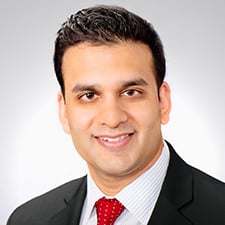As a medical student, do you ever wonder what it’s like to specialize in neurological surgery? Meet Nitin Agarwal, MD, a neurosurgeon and a featured physician in the AMA’s “Shadow Me” Specialty Series, which offers advice directly from physicians about life in their specialties. Check out his insights to help determine whether a career in neurosurgery might be a good fit for you.
The AMA’s Specialty Guide simplifies medical students’ specialty selection process, highlights major specialties, details training information, and provides access to related association information. It is produced by FREIDA™, the AMA Residency & Fellowship Database®.
Learn more with the AMA about the medical specialty of neurological surgery.
“Shadowing” Dr. Agarwal
Specialty: Neurological surgery, complex and minimally invasive spine, neurotrauma.
Practice setting: Academic medicine.
Years in practice: Just graduated from residency. I will be starting practice at Washington University in St. Louis in July of this year.
A typical day as chief resident in my practice: As a recent graduate from the University of Pittsburgh Medical Center Neurological Surgery training program, I wanted to share a typical day as a chief resident.
The day starts bright and early, arriving to the hospital to start chart review on the inpatient census shortly after 5:00 a.m. Then the chief residents meet with all of the residents at 6:00 a.m. in the conference room to conduct morning films rounds where new consults and imaging updates are reviewed as a team. Next each neurosurgery service line, led by a chief resident, will begin ICU rounds in conjunction with the critical care medicine team. Rounds on floor patients follows. Ultimately, each service line patient list then gets staffed with attendings starting around 6:45 a.m.
Once patients on the service have been examined and daily care plans are enacted, the day can begin. New patients are examined in the preoperative holding area for the first case of the day. Imaging and the operative plan are reviewed with the attending surgeon as well. Surgical cases run thoroughout the day of various lengths and complexity.
Of note, the critical part of every case actually occurs long before the patient enters the operating theater. On days outside of the operating theater, residents will participate in clinic learning to formulate diagnoses and treatment plans.
Typically evening rounds and family meetings will begin by 6:00 p.m. Patients from each service line will be examined. Postoperative checks will also be conducted. Once completed, pertinent clinical updates are discussed with attendings. Around 7:00 p.m., the resident team will run the list and discuss patients with the on-call resident. At the end of the day, the chief will prepare and distribute assignments for the next day so each resident can prepare for surgical cases the following day.
The most challenging and rewarding aspects of neurosurgery: Neurosurgical patient care is always high stakes. It truly is a privilege to be able to operate on the brain and spine. The complexity of the neurosurgical diseases and cases demands time and attention. To this end, a strong patient-physician relationship is built with every patient and his or her family. As it is for all physicians, this rapport is one of the most rewarding aspects.
Additionally, the complexity of neurosurgical disorders necessitates the greater length of training of seven years. This time, however, affords the ability to build a strong camaraderie with colleagues which I deeply cherish.
How life in neurosurgery has been affected by the global pandemic: At the start the pandemic, a myriad of changes impacted neurosurgical care, including shortages of personal protective equipment (PPE) and intensive care beds, cancelled surgeries, and staffing shortages.
While there have been periods of relief, these issues do continue to persist. With each new wave or variant, there is a looming threat of halted elective surgeries. At present, there is already a backlog of patients requiring care. Overall, the pandemic has led to a delay of expeditious care which oftentimes can be catastrophic if there are deleterious neurological consequences.
Neurosurgery has had to adapt to continue to accommodate and care for patients by implementing telemedicine to ensure adequate access to providers.
The long-term impact the pandemic will have on neurosurgery: The pandemic has changed the way we interact with patients. When possible, visits are being conducted by telehealth. While this certainly allows for physical distancing and, as a byproduct, increases patient convenience, the patient-physician relationship aspect of medicine must not be forgotten.
An essential part of every encounter, especially in neurosurgery, requires a detailed and thorough neurological exam. It is vital that this aspect of care remains, even as technological advances are incorporated into the healthcare environment.
Three adjectives to describe the typical neurosurgeon: Honest, diligent and resilient.
How my lifestyle matches, or differs from, what I had envisioned: Neurosurgery is not just a vocation, but a way of life.
Skills every physician in training should have for neurosurgery but won’t be tested for on the board exam: The reflexive thought is hand-eye coordination and dexterity. However, it is the humanistic aspects of each physician that are vital to the field of neurological surgery. The intricacies of disorders of the brain and spine require an unwavering devotion to the patient and his or her family. The specialty requires each physician to be not just a surgeon but also a doctor to provide optimal care.
One question physicians in training should ask themselves before pursuing neurosurgery: Can you see yourself choosing another medical field? This classic inquiry of those considering neurological surgery remains true and even more so in the era of the 80-hour work week.
Books every medical student interested in neurosurgery should be reading: Exploring some of the memoirs written by those who have walked the path before can be inspiring.
- When the Air Hits Your Brain, by Frank Vertosick Jr., MD.
- When Breath Becomes Air, by Paul Kalanithi, MD.
- Do No Harm: Stories of Life, Death, and Brain Surgery, by Henry Marsh, MD.
Lastly, I offer a book that I edited to fill the niche of a textbook for those specifically in training called Neurosurgery Fundamentals. This book provides both basic information for those preparing to apply for neurosurgery as well as advice from the masters now practicing.
The online resource students interested in neurosurgery should follow: The websites for our parent organizations American Association of Neurological Surgeons and Congress of Neurological Surgeons are great places to start. Information pertinent to those interested in the field—from the patients to trainees—is readily available. Information on several scholarships, research awards, and grants is available as well.
Quick insights I would give students who are considering neurosurgery: Having a mentor in the field is the greatest asset. I would strongly recommend that students reach out to those already in the field to express their interest. Finding a mentor can be difficult. The mentee must be mindful that mentorship is a two-way street.
A potential mentee should employ the “three A’s” in his or her approach to medical training: availability, affability and accountability, which are often cited as the keys to being a successful neurosurgical trainee. The first step in the path is to show up. Show up early and often. Carry the message.
Song to describe life in neurosurgery: “Tubthumping,” by Chumbawamba. “I get knocked down, but I get up again.”




